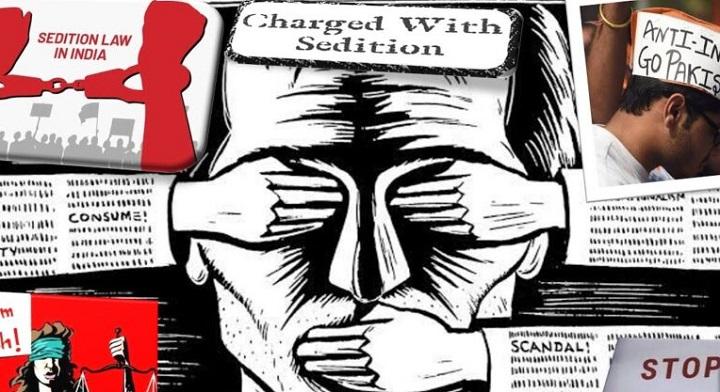Table of Contents
Relevance
- GS Paper 2: Indian Constitution- Structure, organization, and functioning of the Executive and the Judiciary Ministries and Departments of the Government.

Get free video for UPSC CSE preparation and make your dream of becoming an IAS/IPS/IRS a reality
Context
- Recently, Supreme Court while criticizing the government for its frequent use of sedition law, asked why a colonial law used against Mahatma Gandhi and Bal Gangadhar Tilak continued to survive in the law book after 75 years of Independence.
Elderly Population of India: Expert Committee on Longevity Finance (Hindi)
Key points about sedition law
- About: It is a crime under Section 124A of the Indian Penal Code (IPC).
- Definition: Section 124A defines sedition as an offence committed when “any person by words, either spoken or written, or by signs, or by visible representation, or otherwise, brings or attempts to bring into hatred or contempt, or excites or attempts to excite disaffection towards the government established by law in India”.
- Disaffection includes disloyalty and all feelings of enmity.
- However, comments without exciting or attempting to excite hatred, contempt or disaffection, will not constitute an offence under this section.
- Punishment under sedition law:
- Sedition is a non-bailable offence.
- Punishment under Section 124A ranges from imprisonment up to three years to a life term, to which a fine may be added.
- A person charged under this law is barred from a government job.
- They have to live without their passport and must produce themselves in the court at all times as and when required.
- Observations made by freedom fighters:
- Mahatma Gandhi called it- the prince among the political sections of the IPC designed to suppress the liberty of citizens.
- Pandit Jawaharlal Nehru said that the provision was “obnoxious” and “highly objectionable” and “the sooner we get rid of it the better”.
Historical background
- It was originally drafted in 1837 by Thomas Macaulay but later inexplicably omitted when the Indian Penal Code (IPC) was enacted in 1860.
- It was further re-introduced as Section 124A under IPC in 1870 by Sir James Stephen in response to the Wahabi movement.
- It was one of the many draconian laws enacted to stifle any voices of dissent at that time.
Information Technology Rules, 2021
Government’s argument for retaining the sedition law
- To help in effectively combating anti-national, secessionist, and terrorist elements in the country.
- To ensure the stability of the state established under the law: from any attempts to overthrow the government with violence and illegal means.
- To counter violent activities of internal armed groups: who openly talk about overthrowing democratically elected state government by revolution. For example, the Moist insurgency.
Election Commission of India (ECI)
Arguments against sedition law
- Violates right to freedom of speech and expression: which is provided by the Constitution as fundamental rights under article 19.
- Widespread misuse: it is being invoked even in cases where there is no incitement to violence or tendency to create public disorder.
- Its provisions are vague and prone to multiple interpretations, for example, ‘public order, ‘disaffection’, etc. This leads to misuse by the government based on their whims and fancies and other narrow political interest.
- The government uses this tool to suppress dissent and criticism of government which is essential ingredients of public policy in a vibrant democracy.
- It is also being misused as a tool to persecute political dissent.
- Other sections of IPC and laws like the Unlawful Activities Prevention Act 2019 have provisions that penalize “disrupting the public order” or “overthrowing the government with violence and illegal means”.
- These are sufficient for protecting national integrity, eliminating the need for a dedicated Section 124A under IPC.
- Britain (introduce sedition to oppress Indians) has already abolished sedition law in its country, prompting India to do so.
Uttar Pradesh Draft Population Bill 2021
Way forward
- Reconsideration of the sedition law: In August 2018, the Law Commission of India published a consultation paper recommending that it is time to re-think or repeal Section 124A of the Indian Penal Code that deals with sedition.
- Limiting the scope of section 124A: to terrorist activity against India and interests of India along with issues affecting territorial integrity and the sovereignty of the country.
- Sensitization of police and magistrates at the ground level: who often use this draconian law on people committing minor offenses or for which other laws are available.
- India is the world’s largest democracy, and the right to free speech and expression is an essential ingredient of democracy. The expression or thought that does not align with the policy of the government of the day should not be considered as sedition.



 TSPSC Group 1 Question Paper 2024, Downl...
TSPSC Group 1 Question Paper 2024, Downl...
 TSPSC Group 1 Answer key 2024 Out, Downl...
TSPSC Group 1 Answer key 2024 Out, Downl...
 UPSC Prelims 2024 Question Paper, Downlo...
UPSC Prelims 2024 Question Paper, Downlo...




